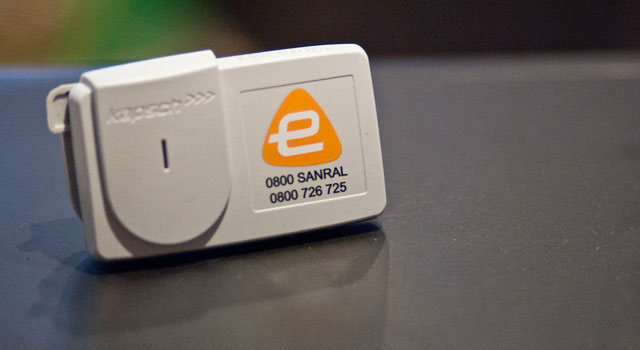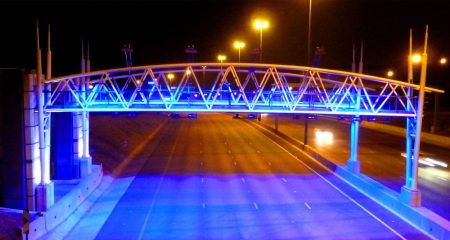
On the second anniversary of the launch of e-tolls, the Opposition to Urban Tolling Alliance (Outa) looks back at a system it says “was doomed from the outset”.
Gauteng’s e-toll scheme was launched exactly two years ago, on 3 December 2013. This, said Outa, took place “despite overwhelming public dissension and warnings that it would not be an effective ‘user-pays’ mechanism to service the Gauteng freeway upgrade bonds”.
The anti-tolls body said its research studied international examples of both failed and successful electronic tolling schemes, and identified eight critical factors required for e-toll systems to succeed. Roads agency Sanral failed on all counts, said Outa. It highlighted five of these areas:
A high degree of public support. “This was not the case with Gauteng’s e-tolls, which peaked at R120m per month by June 2014, less than half their original target of R260m,” said Outa. According to the civil rights body, less than 10% of road users were generating about 23% of e-toll revenue levels required by Sanral.
Weak opposition forces. Outa pointed out that on the contrary, the public’s outrage has been supported by all political parties — with one exception — as well as labour movements, civil action groups and most business associations, “all of which have overwhelmingly opposed the e-toll scheme”.
Adequate public transport alternatives. Outa said that in Gauteng — apart from the Gautrain which caters for a mere 6% of regular commuter traffic between Pretoria and Johannesburg — “public transport alternatives have fallen dismally short of catering for the vehicle-bound commuters in the province”.
User-friendly pricing and billing systems. From the very beginning, said Outa, the e-toll scheme’s complicated tariff and payment structures confused most users. “Even the 46 000 Gauteng taxis that were exempt from paying e-tolls were never fitted with e-tags or properly registered with the scheme, giving rise to more doubt about the scheme’s workability.”
Reliable and trusted technology and data. E-tolls are generally not regarded as trustworthy because of many billing errors and the scheme’s reliance on e-Natis, said Outa. It added: “This was compounded by a court dismissal of the system’s information, which was found to be inaccurate.”
Outa identifies other incidents it said dealt additional blows to the integrity of the e-tolls scheme by further alienating the public and businesses. Some of these were:
— Sanral was issued certificates by the Competition Commission “to pursue inflated road construction prices from collusive construction companies”. Sanral’s lack of enthusiasm to share detailed plans with the public in this regard has been nothing short of disappointing, said Outa.
— According to Outa’s research and in its opinion, Sanral “had grossly overpaid for the Gauteng freeway upgrade, by as much as 67%”.
— The Advertising Standards Authority found in 2014 and 2015 that several Sanral advertisements were misleading.
— Outa also lists what it calls “ongoing exposure of Sanral’s exaggerated e-tag sales claims, which highlighted their misleading impression of the scheme’s success”.
— The Randburg magistrates court dismissed inaccurate gantry information provided during the Duduzane Zuma accident case in November 2014.
— The minister of transport announced in parliament in July 2014 that the government could not under present circumstances realistically pursue enforced compliance prosecution against e-toll defaulters.
— The Western Cape succeeded in its court bid to halt Sanral’s plan to toll the Cape Town freeway upgrade.
— According to Outa, the Freedom Front exposed the e-toll scheme’s failure to have its systems verified by the National Regulator for Compulsory Specifications in terms of the Metrology Act, and pending a ruling by the Consumer Commission.
— One would have thought that the authorities “would have come to their senses and halted this expensive irrational scheme, further sparing the taxpayer millions of rands on a wasteful e-toll marketing campaign”. However, Sanral has “tirelessly launched failed campaign after campaign”, said Outa. It labelled Sanral’s latest 60% discount a “desperate last roll of the dice to claw back some of the R6bn in unpaid e-toll bills”.
“Over the past year, the e-toll scheme’s collection process has literally being kept on life support by government vehicles and a handful of large logistic and fleet based organisations, who are fed up with the scheme but do not have an appetite to rock government’s boat,” said Outa.
It added that it expects Sanral to launch “another costly propaganda drive, in an attempt to paint another false impression of the public’s uptake of their latest dispensation. However, all indications point to a low uptake of their latest offer which has fallen well short of the billions of rands of outstanding e-toll bills they had hoped for.”
Sanral hits back
In a strong response to Outa’s statement, Sanral GM for communications Vusi Mona has debunked some of Outa’s claims. “Outa is an organisation that has no respect for the pronouncements of the judiciary or for our democracy,” Mona said via e-mail.
Mona’s full response will follow… — Fin24




